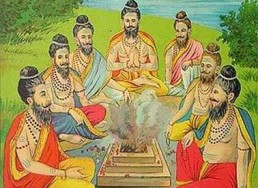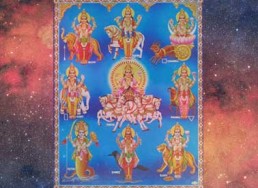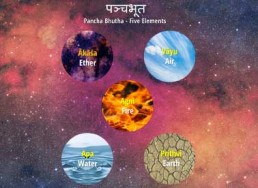Asvatthama Baliyaso Hanuman
कृपः परशुरामश्च सप्तैः ते चिरंजीविन : ।।
kṛpaḥ paraśurāmaśca saptaiḥ te ciraṃjīvina : ..

Description
Prayer to the Immortals. This is also called Sapta Chiranjeevi Stotram. Chiranjeevi is a combination of chiram, or ‘permanent’, and jīvi, or ‘lived’.
The seven Chiranjivis are:
– Vyasa, the sage who composed the Mahabharata. He represents erudition and wisdom. He was the son of sage Parashara and his intimate partner Satyawati, a fisherwoman.[3] and great-grandson of the sage Vashishtha. He was born towards the end of Treta Yuga, lived to see the complete Dvapara Yuga, and saw the initial phase of Kali Yuga.
– Hanuman, one of the greatest brahmachari, served Rama. He stands for selflessness, courage, devotion, intelligence, strength, celibacy and righteous conduct.
– Parashurama, the sixth avatar of Vishnu. He is knowledgeable of all astras, sastras and divine weapons. The Kalki Purana writes that he will reemerge at the end of time to be the martial guru of Kalki. He will then instruct the final Avatar to undertake penance to receive celestial weaponry, required to save mankind at the end time.
– Vibhishana, the brother of Ravana. Vibhishana surrendered to Rama before his battle with Ravana. He was later crowned king of Lanka after Ravana was killed by Rama. He stands for righteousness. Vibhishana is not a true Chiranjivi, as his boon of longevity is to remain on the earth only until the end of the Maha Yuga.
– Ashwatthama, the son of Drona, a great warrior. Drona did many years of severe penance to please lord Shiva in order to obtain a son who possessed the same valor as Lord Shiva. Ashwatthama is the avatar of one of the eleven Rudras. Ashwatthama and Kripa are believed to be the lone survivors still living who had fought in the Kurukshetra War. He might be immortal but Krishna bestowed upon him a curse that, he would live forever but can neither communicate with anyone nor touch anything, with his body covered with painful sores and ulcers that would never [be] cure[d].
– Mahabali was a ruler of demons or asura who existed somewhere around present day Kerala. He was sent into Patal, the underworld by the Vamana avatar of Vishnu.
– Kripa, the royal guru of the princes in the Mahabharata. He was adopted by King Shantanu. His sister was Kripi, who married Dronacharya. Together they gave birth to Ashwatthama. He is known for long life because of impartiality among his students and treated them as his own kids. He along with his nephew Ashwatthama are the lone survivors of all warriors who actually fought in Kurukshetra War.
Apart from the seven Chiranjivis above mentioned, there exist other Chiranjivis as well. For instance, Sage Markandeya, who at the age of sixteen was blessed with immortality.
Markandeya, Markandeya is an ancient rishi born in the clan of Bhrigu Rishi. The Markandeya Purana especially, comprises a dialogue between Markandeya and a sage called Jaimini, and a number of chapters in the Bhagavata Purana are dedicated to his conversations and prayers. He is also mentioned in the Mahabharata.
All chiranjivis are alive just to help Vishnu’s tenth and final avatar or Kalki, to wipe out sinners and restore dharma or righteousness on Earth and open the portal to the next Mahayuga (चतुर्युग) of Surya Savarnika Manavantara or Savarni Manavantara.
अश्वत्थामा बलिव्र्यासो हनूमांश्च विभीषण:। कृप: परशुरामश्च सप्तएतै चिरजीविन:॥ सप्तैतान् संस्मरेन्नित्यं मार्कण्डेयमथाष्टमम्। जीवेद्वर्षशतं सोपि सर्वव्याधिविवर्जित॥
āśwathāma Balirvyāso ḥanumanśca Vibheeśanaha. k͟hrupaha Parśuramasca Saptaitey chiranjivinaha. Saptaitān Samsmareynnityam ṃarkandeymathāśtamam. Jivedvarśśatam Sopi Sarvavyadhivivarjit..
Other Rishis Shlokams
Bhugurvashista Kraturam
Bhrighu, Vashishta, Kratu, Angira, Manu, Pulasthya, Pulaha, Gautama, Raibhya, Marichi, Chyavana and Daksha - may all of them make mine a good morning.
Brahma Murari Tripuranatakari
Brahma, Murari, Shiva, Sun, Moon, Mangal, Budha, Guru, Shukra, Sani, Rahu and Ketu - may all of them make mine a good morning.
Kashyapa Atri Bharadwaja
The saint Kashyapa, Athri, Bharadwaja, Viswamitra, Gautama, Jamadagni and Vashishta - these are the seven rishis to be remembered.
Prithvi Sagandha Sarasa
Shlokams,Rishis,Pancha Bhuta,Navagraha
The fragrant earth, the waters of reservoirs, the touch of the wind, the brilliance of the fire and the great voice of the akasa - may all of them make mine a good morning.
Sadhunam Darsanam
It is virtuous to see sadhus. Sadhus are none but incarnations of the sacred waters. Holy waters grant fruits at the appropriate time, while fruits materialise immediately by the association with sadh
Sanata Kumara Sanaka
Sanatkumara, Sanaka, Sanandana, Sanatana, Aasuri, and the Pingala twins, the seven musical notes, the seven great Lokas - may all of them make mine a good morning.
Saptarnava Sapta Kulachalasca
The seven seas, seven dynasties, seven rishis, seven isles and forests, the seven worlds like the earth - may all of them make mine a good morning.
Asvatthama Baliyaso Hanuman – Rishis – In Sanskrit with English Transliteration, Translation and Meaning. Commentary for selected Shlokams.



